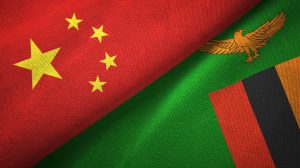Zambia’s President Hakainde Hichilema just returned to Lusaka in a good mood. At the recent IMF and World Bank spring meetings, he was able to announce that China had agreed to his request to join a creditor committee to discuss the restructuring of Zambia’s debt.
This has been a long time coming.
Zambia – a country where 60 percent of the population don’t have access to electricity, 77 percent don’t have access to clean drinking water, 46 percent don’t have access to the internet and where road infrastructure would have to improve by 234 percent just to reach China levels – in May 2020 employed the advice of French firm Lazard at a cost of $5 million to advise on management of the country’s debt. A few months later, in November 2020, the country defaulted on a sovereign loan, and then in February 2021, Zambia applied to be considered under a newly established process set up by the G-20 called the “common framework” designed to help countries weather the storm of COVID-19 with debt relief and restructuring.
Then in October 2021 the Zambian government published updated debt statistics clarifying first that the size of public debt corresponds to roughly 112 percent of the country’s GDP, a rise from the 2020 figure of 85 percent. This still represents less than half of the country’s previous peak ratio of 261 percent registered in the 1990s and puts the country among 20 others that by the end of 2020 had public debt ratios at or above 112 percent – countries as varied as Singapore, the United States, Italy, Angola and Bhutan. Nevertheless, many took the new data as further confirmation that urgent debt restructuring was needed.
However, more recently, some began to directly blame China for an apparent slowdown in discussions, for example during meetings of the G-20. Specifically, China did not seem to be open to meeting with others as a full creditor committee, and this was seen as a problem, given China’s prominence as a lender to Zambia. Around 30 percent of Zambia’s total loans are owed to China, the same percentage as owed to the private sector via “Eurobonds,” versus around 19 percent owed to development banks – mostly the World Bank and African Development Bank. According to the China Africa Research Initiative, Zambia has used Chinese loans for more than 69 projects over the period 2000-2018, mostly in the transport and power sectors.
However, it seems that a breakthrough was finally achieved at the April 2022 IMF and World Bank meetings. After very public requests from Zambia, China agreed to join and possibly chair a committee – the make-up of which is not entirely clear but is likely to include Paris Club bilateral donors such as the United States, France, and the United Kingdom, and multilaterals such as the World Bank and IMF. It is unclear whether any private sector representatives will join.
But is this concession from China as big a win as Zambia’s president and others such as IMF chief Kristina Georgieva are painting it?
History suggests some skepticism.
The fact is, China has cancelled Zambian debt multiple times before, to the tune of $259 million over the period 2000-2018. To put this in context, while Zambia received a total $2 billion in debt relief over the same period from others, the bilateral debt cancellations from several Paris Club members were smaller than China’s – for instance, $151 million from the U.K. and $122 million from the U.S. Similarly, due to the COVID-19 pandemic, China already unilaterally agreed to an (undisclosed) deferment of interest payments from Zambia in October 2020. China didn’t have to work with other creditors to do so.
So why has China agreed to join the creditor committee? Why not remain outside?
The phrase “you don’t ask, you don’t get” is pertinent here. In line with the Chinese government’s policy of non-interference, if a sovereign nation makes a decision about its loans from China, Chinese stakeholders will typically be subordinate to that decision. For instance, if a country has a national law that all loan-related contracts must be published those negotiated with China will be released to the public (even if there are confidentiality clauses). A classic example of this in Africa is Cameroon, the source of over 25 percent of publicly disclosed loan contracts in a comprehensive database. Hence, since Zambia insisted on China joining the committee, China joined. China will no doubt find the process interesting – China has never required debt relief from the Paris Club itself.
So will Zambia win now? Should President Hilechema remain cheerful? Perhaps. The World Bank has already agreed to disburse fresh loans of $560 million to the country (although it is unclear for what exactly) and there are promises of more from the IMF.
However, two caveats remain. First, it is unclear how having more creditors around the table is helpful to Zambia. In Paris Club negotiations, debtors are not allowed to remain in the room. A French representative conducts shuttle diplomacy to inform the debtor of the outcome. While Chinese lending terms can certainly be improved, it is highly unlikely that China joining such an antiquated, colonial arrangement will lead to better development finance from China to Zambia.
Second, if Zambia does achieve restructuring and/or is offered more fresh loans from multilaterals and Paris Club donors, it is unclear what conditions they will come with. Oxfam recently found that 13 out of the 15 IMF loan programs negotiated in 2021 required new austerity measures. This is reminiscent of Structural Adjustment Programs introduced by the IMF and World Bank in the 1980s and 1990s to ostensibly address debt crises, but which are now understood to have exacerbated economic challenges.
In short, while Zambia’s president might be excited about bringing China into the creditor club, much bigger fundamental challenges beyond China may well lie ahead.

































